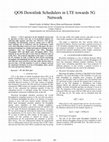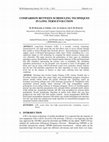Papers by Ahmed Al-ssaggaf

— LTE is expected to be the dominant system used by operators in these years due to its promising... more — LTE is expected to be the dominant system used by operators in these years due to its promising solutions for achieving high capacity and data rate. However, LTE packet scheduling and distributing resources among users is still the main challenge due to unfairness and low performance which occur when allocating resources to users. In this paper, the above mentioned challenges are studied and analysed, focusing on three schedulers; they are Proportional Fair (PF), Maximum Throughput (MT) and Blind equal throughput (BET). These methods do not provide QoS to users that use different types of traffic flows. The proposed algorithm in this paper is to modify the PF scheduler in order to fulfil the QoS criteria maximizing throughput and minimizing the delay for real time service. VoIP and video have been selected as real time traffic and best effort as non-real time. LTE-Sim simulator is used to compare between the mentioned schedulers in terms of throughput, delay, packet loss ratio and spectrum efficiency.

ABSTRACT Long-Term Evolution (LTE) is a recently evolving technology characterized by very high s... more ABSTRACT Long-Term Evolution (LTE) is a recently evolving technology characterized by very high speed data rate that allows users to access internet through their mobile as well as through other electronic devices. Such technology is intended to support variety of IP-based heterogeneous traffic types. Traffic scheduling plays an important role in LTE technology by assigning the shared resources among users in the most efficient manner. This paper discusses the performance of three types of scheduling algorithms namely: Round Robin, best Channel Quality Indicator (CQI) and Proportional Fair (PF) schedulers representing the extreme cases in scheduling. The scheduling algorithms performances on the downlink were measured in terms of throughput and block error rate using a MATLAB-based system level simulation. Results indicate that the best CQI algorithm outperforms other algorithms in terms of throughput levels but on the expense of fairness to other users suffering from bad channel conditions.

Long-Term Evolution (LTE) is a recently evolving technology characterized by very high speed data... more Long-Term Evolution (LTE) is a recently evolving technology characterized by very high speed data rate that allows users to access internet through their mobile as well as through other electronic devices. Such technology is intended to support variety of IP-based heterogeneous traffic types. Traffic scheduling has a very significant impact in LTE technology by assigning the shared resources among users very efficiently. This paper discusses the performance of three types of scheduling algorithms namely: Round Robin, best Channel Quality Indicator (CQI) and Proportional Fair (PF) schedulers representing the extreme cases in scheduling. The scheduling algorithms performances on the downlink were measured in terms of throughput and block error rate by using a MATLAB-based system level simulation. Results indicate that the best CQI algorithm outperforms the other algorithms in terms of throughput levels but on the expense of fairness to other users suffering from bad channel conditions. ABSTRAK: Teknologi baru Evolusi Jangka Panjang (LTE) sentiasa berubah dan ia bercirikan kelajuan kadar data sangat tinggi yang membolehkan pengguna mengakses internet melalui telefon bimbit dan peranti elektronik lain. Teknologi seperti ini bertujuan menyokong pelbagai jenis trafik heterogen berasaskan IP. Penjadualan trafik memainkan peranan penting dalam teknologi LTE bagi mengagihkan sumber perkongsian secara paling berkesan di kalangan pengguna. Kertas ini membincangkan prestasi tiga jenis algoritma penjadualan iaitu: pusingan Robin, penunjuk kualiti saluran (CQI) terbaik dan penjadualan berkadar adil (PF) yang merupakan kes ekstrem dalam penjadualan. Prestasi penjadualan Algoritma di pautan turun diukur dari segi daya pemprosesan dan kadar ralat blok melalui simulasi sistem menggunakan MATLAB. Hasil kajian menunjukkan algoritma CQI adalah yang terbaik berbanding hasil algoritma lain dari segi tahap daya pemprosesan tetapi algoritma ini menyebabkan pengguna lain mengalami keadaan saluran buruk.

Uploads
Papers by Ahmed Al-ssaggaf